types of carbs?
types of carbs?
Have a 1962 fc with a 1965-1968 replaced engine. need carb gaskets and was wanting to know if carbs were all pretty standard. Have a 62 shop manual but not a 65-68 book for part numbers. Do I need serial # off carbs? thanks for a quick help
-
corvair500
- Posts: 297
- Joined: Sat Oct 13, 2018 3:09 am
- Location: Virginia
Re: types of carbs?
Carb bases are all same except for turbo
- bbodie52
- Corvair of the Month

- Posts: 12140
- Joined: Mon Aug 06, 2012 12:33 pm
- Location: Lake Chatuge Hayesville, NC
- Contact:
Re: types of carbs?
The attached DELCO ROCHESTER - Models H, HV Carburetor Service Guide does a good job of describing the variations and differences that were engineered into the Corvair Rochester carburetors over the years. The guide also describes the function of each carburetor subsystem, and how they changed over the model years (and why).
The other references include the shop manuals and supplements and tune-up instructions over the model years.
It is important to try to match the left and right carburetors so that the internal configurations and components are close to identical between the left and right carburetor.

Part number C3939: BOOK-CARBS BY BOB HELTHow to Identify and Rebuild Corvair Rochester Carbs
by Bob Helt
This has to be the most complete reference for Corvair carbs. Over 80 pages including: many excellent photos, complete details on all aspects, identifying carbs (and which parts go in which carbs), how the carb works, carb problems, modifications, rebuilding, adjustments and more.
C3939 1 lb
Weight: 1 lbs 0 oz
Catalog Page(s): 251
Price: $ 29.45
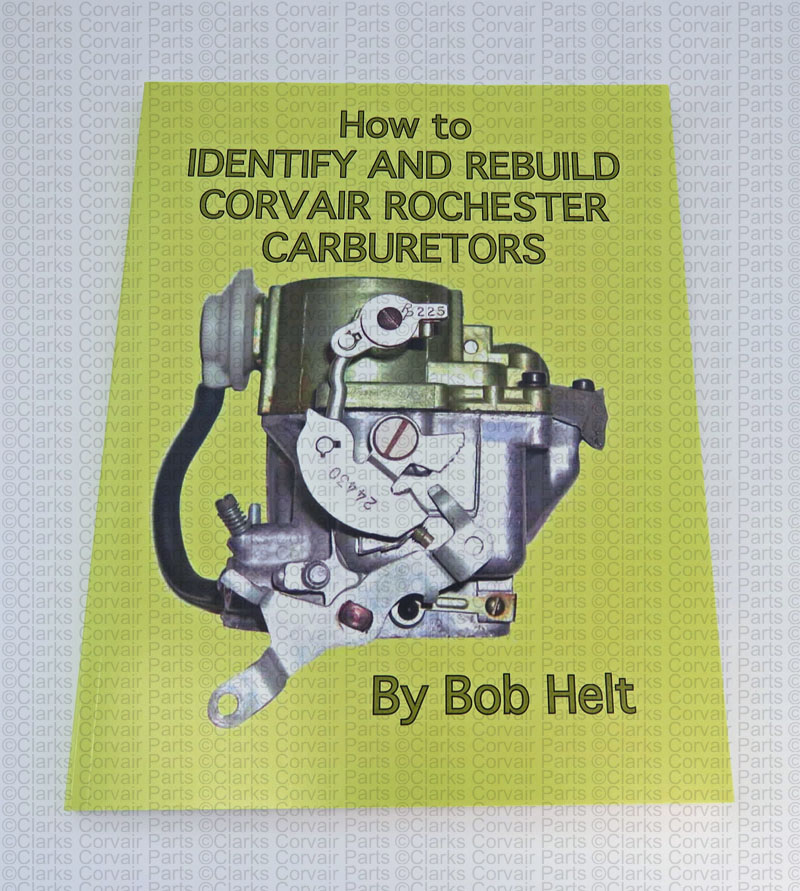
The link below will provide you with a list of useful websites that are Corvair-related. Some of the links will lead you to an extensive technical library that will allow you to download shop manuals and other technical references in Adobe Reader (.pdf) format at no cost. There is also a link that will help you to locate nearby CORSA (Corvair Society of America) club chapters. While the Corvair Forum can be very helpful as you work on your Corvair, having local friends and contacts in your region who are knowledgeable about the Corvair can also be very helpful. These family-friendly CORSA club chapters often offer picnics, group scenic drives, technical training and assistance, car shows, and competition events that can greatly enhance your enjoyment of Corvair ownership. You will also find a list of essential Corvair parts suppliers.
Common and Useful Corvair Websites
- Attachments
-
- DELCO ROCHESTER - Models H, HV Carburetor Service Guide.pdf
- DELCO ROCHESTER - Models H, HV Carburetor Service Guide
- (1.79 MiB) Downloaded 84 times
-
- 1965 Corvair Assembly Manual - CARBURETOR & FUEL SYSTEM.pdf
- 1965 Corvair Assembly Manual - CARBURETOR & FUEL SYSTEM
- (3.92 MiB) Downloaded 51 times
-
- Corvair H and HV Carburetor Rebuild Sheet.pdf
- Corvair H and HV Carburetor Rebuild Sheet
- (1.67 MiB) Downloaded 73 times
-
- 1961 Chevrolet Corvair Shop Manual - Section 7 - Engine Tune-Up.pdf
- 1961 Chevrolet Corvair Shop Manual - Section 7 - Engine Tune-Up
- (644.51 KiB) Downloaded 85 times
-
- 1961 Chevrolet Corvair Shop Manual - Section 9 - Fuel & Exhaust Systems.pdf
- 1961 Chevrolet Corvair Shop Manual - Section 9 - Fuel & Exhaust Systems
- (1.31 MiB) Downloaded 34 times
-
- 1962-1963 Supplement - Chevrolet Corvair Shop Manual - Section 7 - Engine Tune-Up.pdf
- 1962-1963 Supplement - Chevrolet Corvair Shop Manual - Section 7 - Engine Tune-Up
- (899.84 KiB) Downloaded 68 times
-
- 1962-1963 Supplement - Chevrolet Corvair Shop Manual - Section 9 - Fuel & Exhaust Systems.pdf
- 1962-1963 Supplement - Chevrolet Corvair Shop Manual - Section 9 - Fuel & Exhaust Systems
- (3.83 MiB) Downloaded 65 times
-
- 1964 Supplement - Chevrolet Corvair Shop Manual - Section 7 - Engine Tune-Up.pdf
- 1964 Supplement - Chevrolet Corvair Shop Manual - Section 7 - Engine Tune-Up
- (931.65 KiB) Downloaded 43 times
-
- 1964 Supplement - Chevrolet Corvair Shop Manual - Section 9 - Fuel & Exhaust Systems.pdf
- 1964 Supplement - Chevrolet Corvair Shop Manual - Section 9 - Fuel & Exhaust Systems
- (3.99 MiB) Downloaded 75 times
-
- 1965 Corvair Chassis Shop Manual - SECTION 6 - ENGINE TUNE-UP.pdf
- 1965 Corvair Chassis Shop Manual - SECTION 6 - ENGINE TUNE-UP
- (2.92 MiB) Downloaded 61 times
-
- 1965 Corvair Chassis Shop Manual - SECTION 6M - ENGINE FUEL.pdf
- 1965 Corvair Chassis Shop Manual - SECTION 6M - ENGINE FUEL
- (8.87 MiB) Downloaded 51 times
Brad Bodie
Lake Chatuge, North Carolina
 1966 Corvair Corsa Convertible
1966 Corvair Corsa Convertible
Lake Chatuge, North Carolina
 1966 Corvair Corsa Convertible
1966 Corvair Corsa Convertible- terribleted
- Posts: 4584
- Joined: Sun Apr 18, 2010 2:36 pm
- Location: Atlanta, GA
- Contact:
Re: types of carbs?
Not true. There are many different variations of carb bases and tops. The same rebuild kit pretty much services all of the H and HV carbs. The turbo side draft carb is another story. That said you need to compare both carbs you have to see if they indeed match. Do both have idle vents in the bases or not for instance. Are the venturi clusters the same? Do they have or not have power enrichment needles in them? Exactly matching carbs are best.
Corvair guy since 1982. I have personally restored at least 20 Vairs, many of them restored ground up.
Currently working full time repairing Corvairs and restoring old cars.
https://www.facebook.com/tedsautorestoration/
Located in Snellville, Georgia
Currently working full time repairing Corvairs and restoring old cars.
https://www.facebook.com/tedsautorestoration/
Located in Snellville, Georgia
-
corvair500
- Posts: 297
- Joined: Sat Oct 13, 2018 3:09 am
- Location: Virginia
Re: types of carbs?
http://www.corvair.com/user-cgi/search.cgi?part=C8183 Clarks lists the gasket kit for all 62-69
- bbodie52
- Corvair of the Month

- Posts: 12140
- Joined: Mon Aug 06, 2012 12:33 pm
- Location: Lake Chatuge Hayesville, NC
- Contact:
Re: types of carbs?
1962-1969 Corvairs all had automatic chokes. The first two years were still under development in the choke department. The Rochester carburetors and Corvair fuel systems began to settle down in 1962, with minor refinements, Positive Crankcase Ventilation (PCV) introduced in 1963, and Air Injection Reactors (SMOG Pumps) invading the Corvair engines in the last few years. A picture of your engine, the engine serial number, and perhaps the cylinder head casting numbers would help to clearly identify your engine. See page 10 of the attached CORSA Corvair Technical Guide 1+2 - Corvair Code Numbers for info on Carburetor ID Tags.

 http://www.corvair.com/user-cgi/catalog ... nd_page=57
http://www.corvair.com/user-cgi/catalog ... nd_page=57
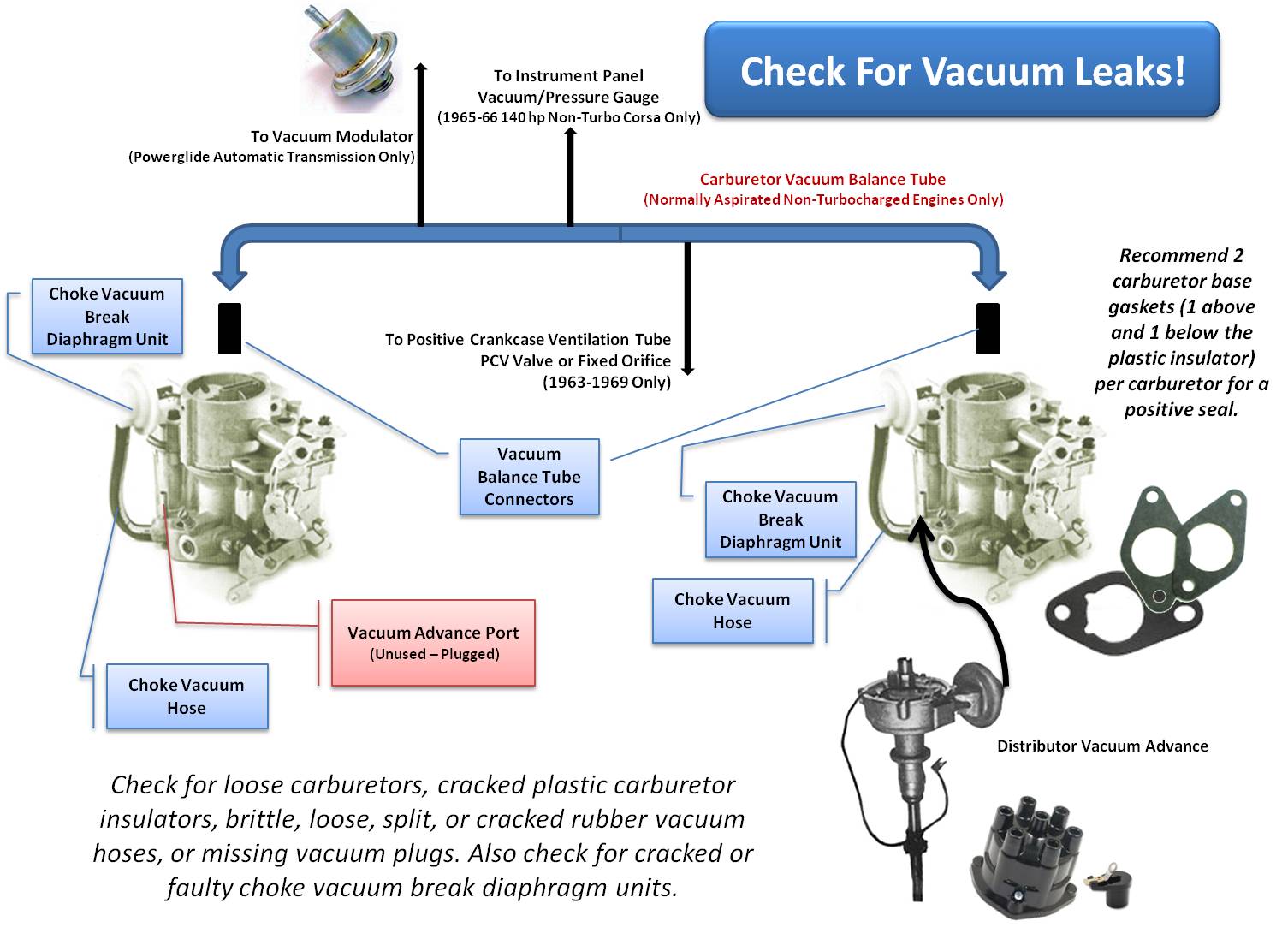
A few points about the Corvair fuel pump...
You may need to check the fuel pump and the pump feed lines from the tank. Also check to ensure that the pump is properly installed at the correct insertion depth by the tapered bolt.
There are two relatively simple tests outlined in the Corvair shop manual. These tests measure output pressure and fuel delivery volume. The output pressure test utilizes a common vacuum/pressure gauge that is relatively inexpensive. The output pressure is regulated by an internal spring that is contained in the upper pump housing. Unless your pump springs a leak in one of the diaphragms or seals, it is likely that the output pressure will not change with age. However, new pumps may be fitted with a spring that produces an output pressure well in excess of the 4-5 psi standard. High-pressure can cause carburetor flooding, and is particularly a problem with the Carter YH carburetor found on turbocharged Corvairs, which is sensitive to excessive fuel pressure.
A new fuel pump should always be tested for output pressure. If the pressure is found to be excessive it may be possible to cut the spring or to exchange the spring from the old pump and fit it into the new pump. This may correct the output pressure.
The second test measures fuel flow at the fuel pump outlet. The standard in the shop manual states that the pump should be able to deliver 1 pint of fuel over a period of 40 seconds or less at engine cranking speed. If your pump does not appear to have any leaks and can pass the output pressure test, but fails to deliver the needed fuel volume, the problem may not be with the pump itself. There is a long fuel line that runs the length of the car from the fuel tank to the fuel pump. In order to pressurize and deliver fuel to the carburetors, the pump must be able to create a continuous vacuum in that fuel line to draw the fuel from the tank to the pump. Most of the fuel line is made up of steel tubing and is unlikely to develop a leak. However, there are two short lengths of rubber fuel hose in the fuel path. One section of hose is found at the fuel tank outlet, while the other is found adjacent to the starter motor — just before the line enters the engine compartment. The purpose of the second hose is to absorb vibration from the engine and prevent it from reaching the rigid steel fuel line. If either one of these two hoses develops a leak, the leak itself may not be apparent because the line is not under pressure so fuel will not be forced out. Instead, the leak amounts to a vacuum leak, which can allow air to enter the fuel line. This can prevent fuel from being drawn from the tank to the fuel pump, much like you might experience with a drinking straw if the straw was to split and developed an air leak in the side of the straw. What appears to be a faulty pump that is causing fuel starvation problems in the carburetors often turns out to be a leak in the fuel line at some point between the gas tank and the fuel pump. So if fuel starvation becomes a problem with your carburetors, there is a tendency to question the condition of the needle and seat valve inside the carburetor, or to blame the fuel filter at the carburetor inlet (thinking it is clogged), or to blame the fuel pump itself. Before you blame the pump and toss it, or abandon it and replace it with electric fuel pump, be sure to check the condition of the rubber fuel hoses at each end of the long fuel line between the fuel tank and the fuel pump. You may find that a couple of hose clamps and a few inches of replacement fuel hose is all that necessary to get you back on the road!
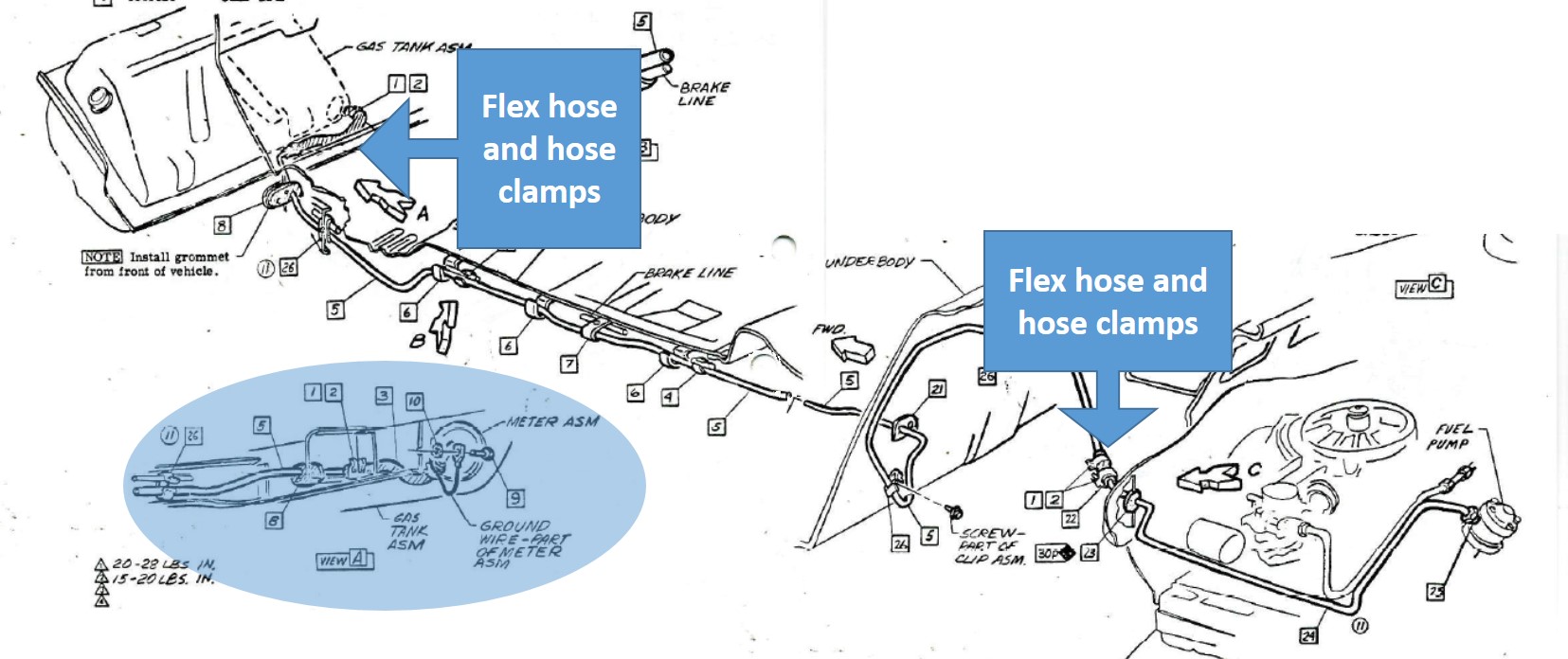
To remove and reinstall the fuel pump, be sure that you have installed it properly. It is important to ensure that the fuel pump is correctly seated and installed. There is a hole in the side of the pump shaft that the tapered bolt tip must seat into. If the pump is sitting too high and the bolt is simply pressing against the side of the pump housing, rather than seating inside the tapered hole, the pump push rod will not be doing its job. Fig. 57 in the shop manual page shows the tapered hole that the tip of the bolt fits into. This ensures proper installation and seating of the pump.
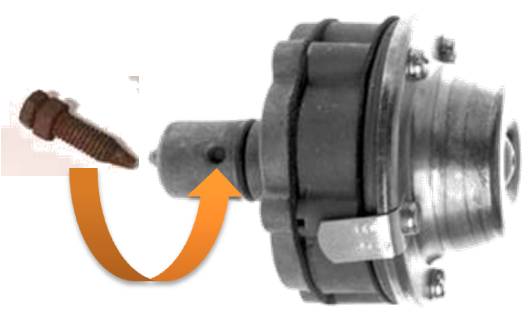
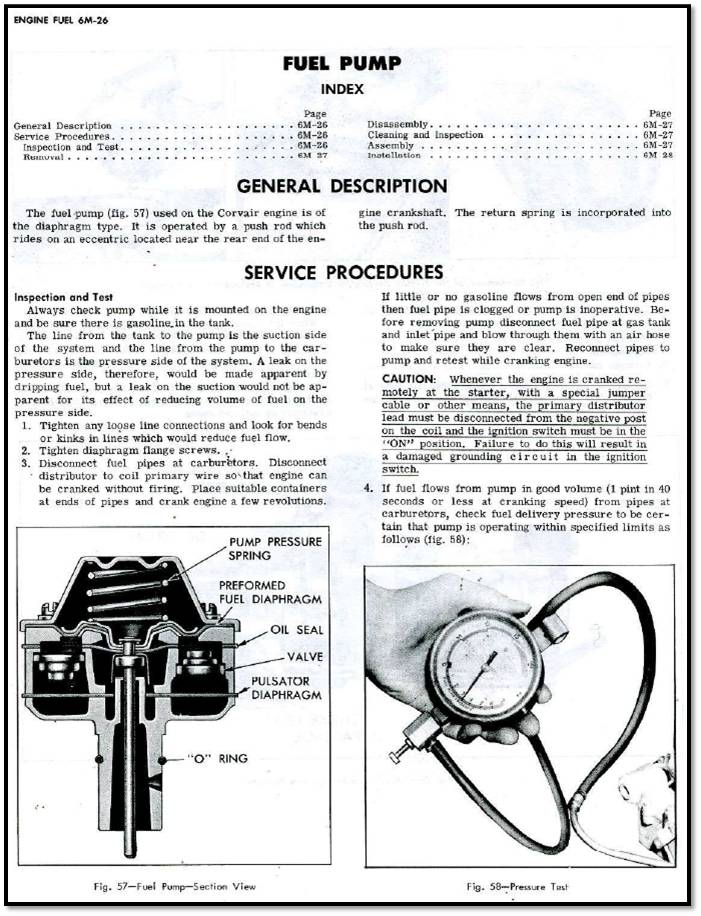
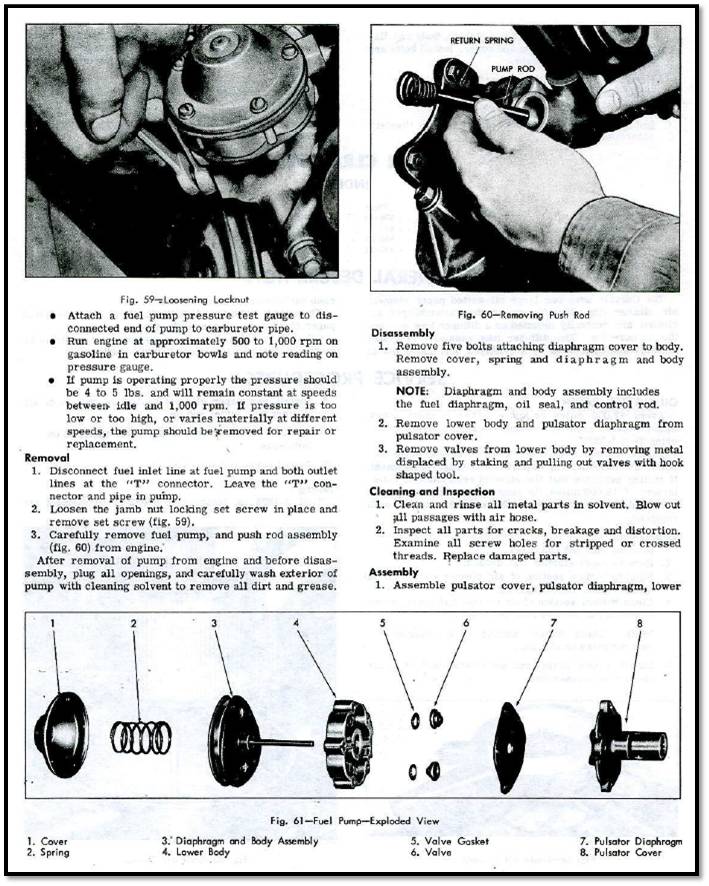
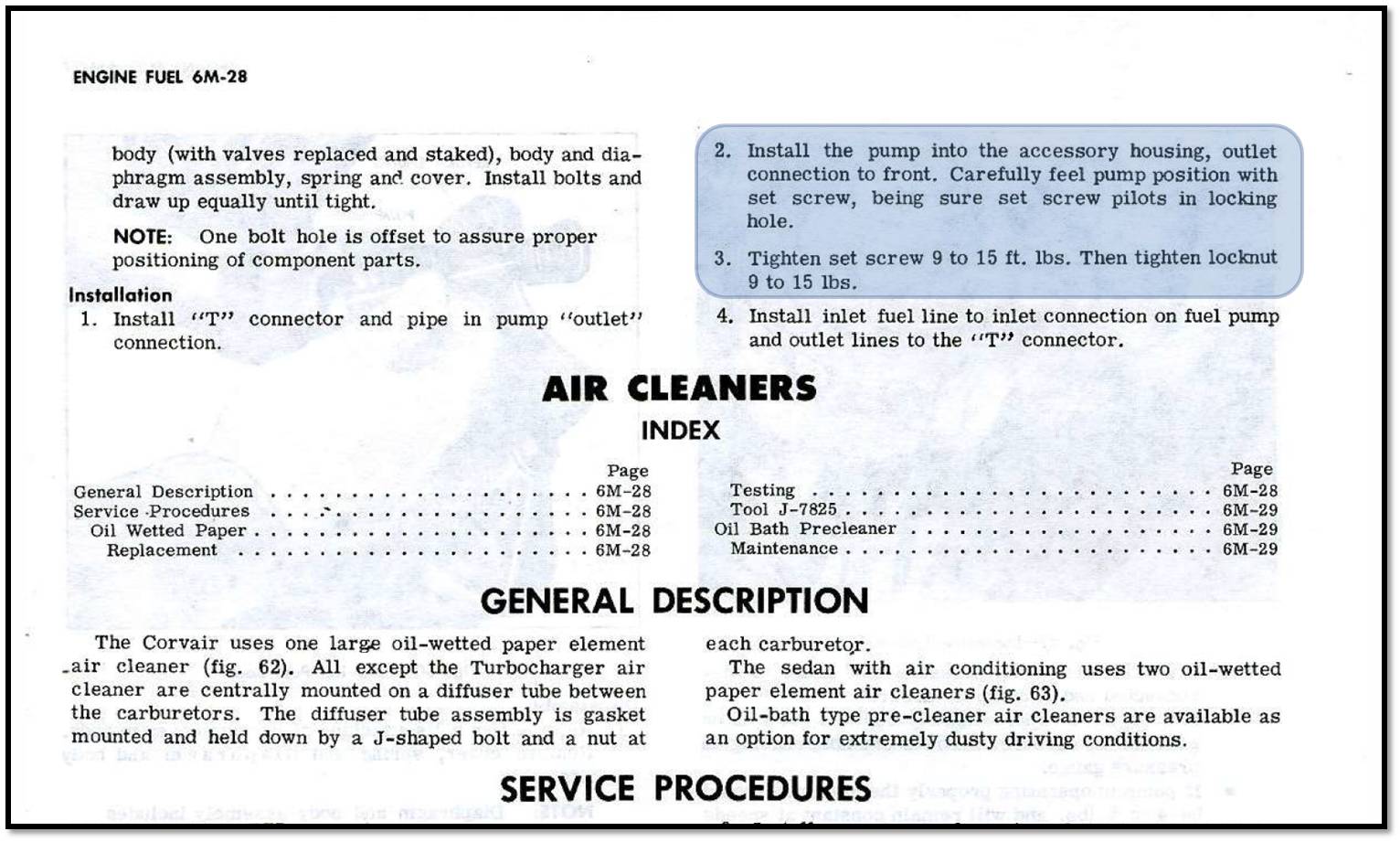

A few points about the Corvair fuel pump...
You may need to check the fuel pump and the pump feed lines from the tank. Also check to ensure that the pump is properly installed at the correct insertion depth by the tapered bolt.
There are two relatively simple tests outlined in the Corvair shop manual. These tests measure output pressure and fuel delivery volume. The output pressure test utilizes a common vacuum/pressure gauge that is relatively inexpensive. The output pressure is regulated by an internal spring that is contained in the upper pump housing. Unless your pump springs a leak in one of the diaphragms or seals, it is likely that the output pressure will not change with age. However, new pumps may be fitted with a spring that produces an output pressure well in excess of the 4-5 psi standard. High-pressure can cause carburetor flooding, and is particularly a problem with the Carter YH carburetor found on turbocharged Corvairs, which is sensitive to excessive fuel pressure.
A new fuel pump should always be tested for output pressure. If the pressure is found to be excessive it may be possible to cut the spring or to exchange the spring from the old pump and fit it into the new pump. This may correct the output pressure.
The second test measures fuel flow at the fuel pump outlet. The standard in the shop manual states that the pump should be able to deliver 1 pint of fuel over a period of 40 seconds or less at engine cranking speed. If your pump does not appear to have any leaks and can pass the output pressure test, but fails to deliver the needed fuel volume, the problem may not be with the pump itself. There is a long fuel line that runs the length of the car from the fuel tank to the fuel pump. In order to pressurize and deliver fuel to the carburetors, the pump must be able to create a continuous vacuum in that fuel line to draw the fuel from the tank to the pump. Most of the fuel line is made up of steel tubing and is unlikely to develop a leak. However, there are two short lengths of rubber fuel hose in the fuel path. One section of hose is found at the fuel tank outlet, while the other is found adjacent to the starter motor — just before the line enters the engine compartment. The purpose of the second hose is to absorb vibration from the engine and prevent it from reaching the rigid steel fuel line. If either one of these two hoses develops a leak, the leak itself may not be apparent because the line is not under pressure so fuel will not be forced out. Instead, the leak amounts to a vacuum leak, which can allow air to enter the fuel line. This can prevent fuel from being drawn from the tank to the fuel pump, much like you might experience with a drinking straw if the straw was to split and developed an air leak in the side of the straw. What appears to be a faulty pump that is causing fuel starvation problems in the carburetors often turns out to be a leak in the fuel line at some point between the gas tank and the fuel pump. So if fuel starvation becomes a problem with your carburetors, there is a tendency to question the condition of the needle and seat valve inside the carburetor, or to blame the fuel filter at the carburetor inlet (thinking it is clogged), or to blame the fuel pump itself. Before you blame the pump and toss it, or abandon it and replace it with electric fuel pump, be sure to check the condition of the rubber fuel hoses at each end of the long fuel line between the fuel tank and the fuel pump. You may find that a couple of hose clamps and a few inches of replacement fuel hose is all that necessary to get you back on the road!
To remove and reinstall the fuel pump, be sure that you have installed it properly. It is important to ensure that the fuel pump is correctly seated and installed. There is a hole in the side of the pump shaft that the tapered bolt tip must seat into. If the pump is sitting too high and the bolt is simply pressing against the side of the pump housing, rather than seating inside the tapered hole, the pump push rod will not be doing its job. Fig. 57 in the shop manual page shows the tapered hole that the tip of the bolt fits into. This ensures proper installation and seating of the pump.
Brad Bodie
Lake Chatuge, North Carolina
 1966 Corvair Corsa Convertible
1966 Corvair Corsa Convertible
Lake Chatuge, North Carolina
 1966 Corvair Corsa Convertible
1966 Corvair Corsa Convertible-
joelsplace
- Posts: 2611
- Joined: Wed Oct 13, 2010 12:51 pm
- Location: Northlake, TX
Re: types of carbs?
The OP doesn't really give enough information to answer the specific question. If the question is about the gaskets and insulators between the heads and carbs then the "all the same except turbo" is a good answer but if the gaskets needed are carburetor base to carburetor top it isn't a good answer because they aren't all the same. Apparently Clark's replacement gasket is universal since it shows 60-69 but I have a stack of gaskets and 2 distinct styles or maybe my mind is just slipping worse than I thought.
160 Corvairs, 5 Ultravans and counting
Northlake, TX
Northlake, TX
- bbodie52
- Corvair of the Month

- Posts: 12140
- Joined: Mon Aug 06, 2012 12:33 pm
- Location: Lake Chatuge Hayesville, NC
- Contact:
Re: types of carbs?
Most of the components that wear out and need replacement are all included in the rebuild kits and are a universal fit. The differences in the carburetor designs evolved over the years to compensate for problems that were discovered over time. Each carburetor should be carefully inspected and inventoried to make sure that components are not missing or that they may be a mismatch that was substituted over time by previous owners. These are the "hard parts" that get soaked in the parts dip and are reused. Some issues like throttle body to throttle shaft wear, cracks and leaks in the choke vacuum break mechanism, fuel leaks in the float assembly floats, etc. must be carefully checked. Reused components in the two primaries should be identical.
Clark's has attempted to deal with worn throttle shaft vacuum leaks, and worn throttle bodies by offering seal kits...
 http://www.corvair.com/user-cgi/catalog ... ow_page=58
http://www.corvair.com/user-cgi/catalog ... ow_page=58
Throttle shaft butterfly valve screws are brass and are staked at the factory to prevent them from vibrating loose and falling into the intake manifold. Be sure to stake the threads on the new screws if you choose to remove the old screws for some reason. Generally they should not be removed unless the throttle shaft is determined to be worn and needs replacement and/or seals installed.
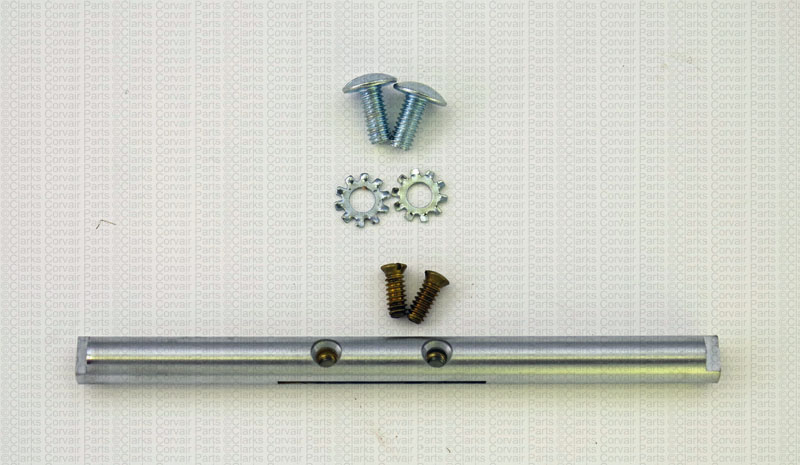
Part number C1473: THROTTLE SHAFT SEAL KIT FOR 2 CARBS (KIT FOR 4 CARBS=C1474)
Weight: 0 lbs 4 oz
Catalog Page(s): 59
Price: $ 10.90
Part number C5271 (Other): TEFLON BUSHING KIT FOR 2 CARBS
Weight: 0 lbs 4 oz
Catalog Page(s): 59
Price: $ 28.65
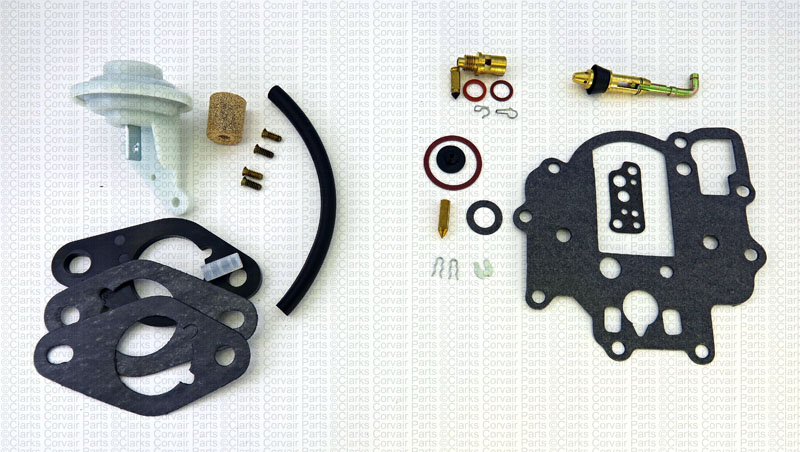
DELUX CARB KIT- 62-69
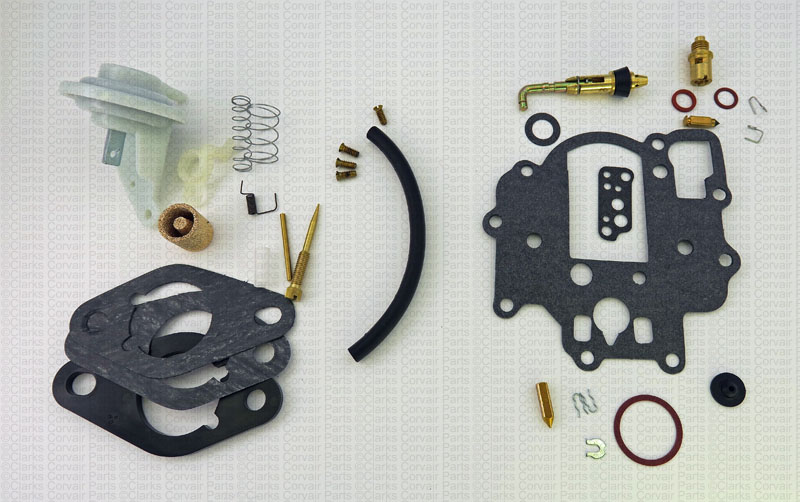
SUPER DELUX CARB KIT-62-69
Clark's has attempted to deal with worn throttle shaft vacuum leaks, and worn throttle bodies by offering seal kits...
Throttle shaft butterfly valve screws are brass and are staked at the factory to prevent them from vibrating loose and falling into the intake manifold. Be sure to stake the threads on the new screws if you choose to remove the old screws for some reason. Generally they should not be removed unless the throttle shaft is determined to be worn and needs replacement and/or seals installed.

Part number C1473: THROTTLE SHAFT SEAL KIT FOR 2 CARBS (KIT FOR 4 CARBS=C1474)
Weight: 0 lbs 4 oz
Catalog Page(s): 59
Price: $ 10.90
Part number C5271 (Other): TEFLON BUSHING KIT FOR 2 CARBS
Weight: 0 lbs 4 oz
Catalog Page(s): 59
Price: $ 28.65

DELUX CARB KIT- 62-69

SUPER DELUX CARB KIT-62-69
Brad Bodie
Lake Chatuge, North Carolina
 1966 Corvair Corsa Convertible
1966 Corvair Corsa Convertible
Lake Chatuge, North Carolina
 1966 Corvair Corsa Convertible
1966 Corvair Corsa Convertible